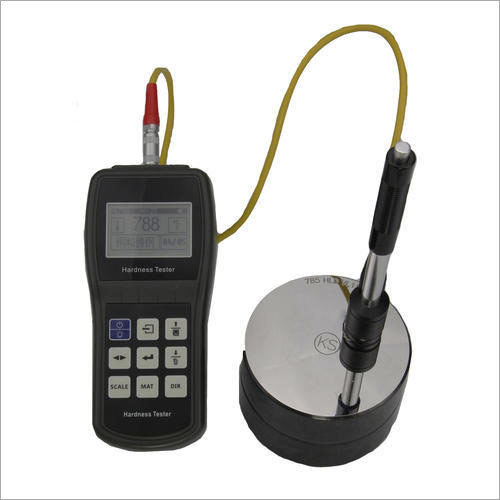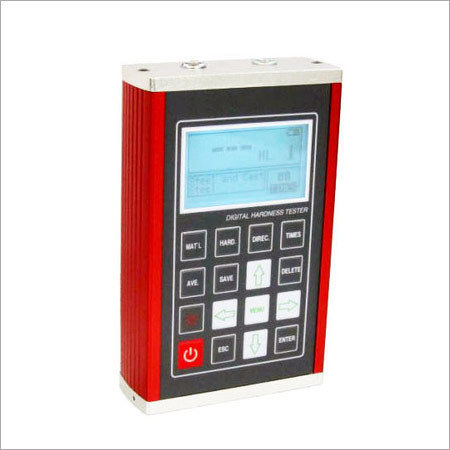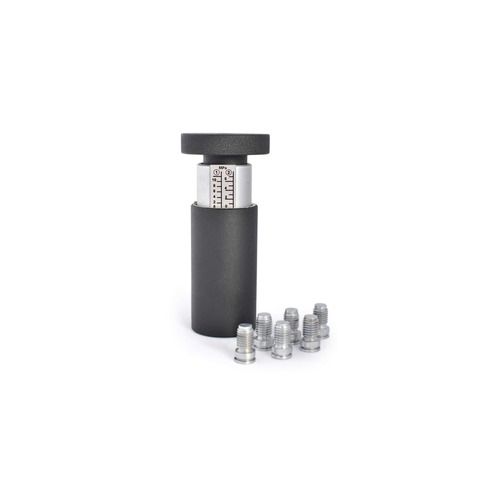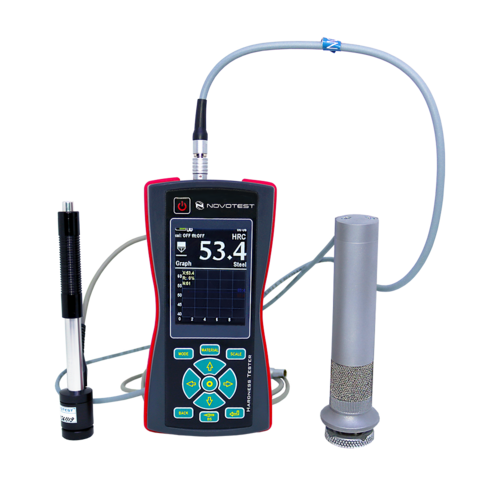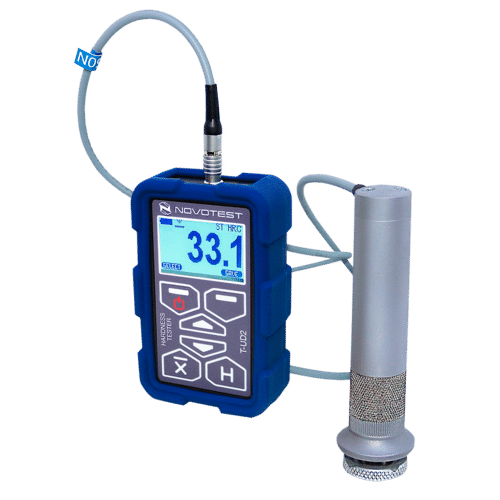Portable Leeb Hardness Tester
10000 INR/Unit
Product Details:
- Display Type LCD digital display
- Accuracy 6 HL (0.5% at LD=600 HL)
- Usage laboratory
- Humidity 90% RH
- Application Industrial
- Automation Grade Manual
- Operating Voltage DC 3V
- Click to View more
X
Portable Leeb Hardness Tester Price And Quantity
- 1 Unit
- 10000 INR/Unit
Portable Leeb Hardness Tester Product Specifications
- Handheld
- 1 HL
- 170-960 HL
- 170-960 HL
- Gray
- Single-piece testing
- Leeb, HB, HV, HRC, HRB, HS conversions supported
- 200 data memories
- 50 Hz
- 6 measurements per second
- Portable Leeb Hardness Tester
- Minimum weight 2kg (compact), 5 kg without support
- -10C to 50C
- 2 x AA alkaline batteries (1.5V)
- 11 mm (impact device)
- Approximately 400 g
- Immediate, <1 second
- Standard USB
- stainless steel
- DC 3V
- USB
- Portable Leeb Hardness Tester
- Manual
- Portable, rechargeable, backlight display, data storage
- Manual
- 90% RH
- Industrial
- laboratory
- LCD digital display
- 6 HL (0.5% at LD=600 HL)
Portable Leeb Hardness Tester Trade Information
- 100 Unit Per Week
- 1 Week
Product Description
A Leeb hardness tester is a portable device used to measure the hardness of metals quickly and non-destructively. It's commonly used in various industries such as manufacturing, construction, and engineering for quality control and inspection purposes.
The principle behind Leeb hardness testing involves a small, spring-loaded impact body with a tungsten carbide tip that is propelled against the surface of the material being tested. The device measures the rebound velocity of the impact body after it strikes the surface. The rebound velocity is then converted into a hardness value, typically expressed in units such as Rockwell, Brinell, or Vickers hardness.
Leeb hardness testers are popular due to their portability, ease of use, and ability to provide quick hardness measurements without the need for extensive sample preparation. They are particularly useful for testing large or awkwardly shaped parts where traditional hardness testing methods may be impractical.
- Portable Leeb Hardness Tester PROLH210
- Model No. PRLH210Dimensions (mm) 155x77x35Weight 220g(Main Unit + Impact Device Type D)Warranty 12/months
- Based on Leeb (HL), Converted to Vickers (HV), Brinell (HB), Rockwell (HRC and HRB), Shore (HS) and tensile strength (MPa).
- 6 hardness scales, each scale can be calibrated independently. Automatic identification of the impact device.
- Compatible with multiple impact devices, 7 different Impact devices optional. 128×64 Dot Matrix LCD Display with backlights& contrast adjustable.
- To derive the testing data easily by the special PC software.
- Preset measurement times (1-32) to calculate the average value automatically.
- Preset Lower and upper limit.
- Automatic power off.
- Testing Range 170-960HLD
- Min. Reading 1HLD, 1HV, 1HB, 0.1HRC, 0.1HRB, 1HS, 1Mpa
- Hardness Scales HL, HRC, HRB, HV, HB, HS
- Testing Range +-6HLDwhen HLD=760+/-30;
- Min.Reading Leeb, conversion hardness, material, impact direction, test times, average value, time
- Hardness Direction 360 Degreedown, inclined down, level,inclined up and up
- Memory 100 groups of testing results
- Power Supply 3×1.5V AAA batteries
- Weight 220g (Main Unit + Impact Device Type D)
- Dimensions in mm 155x77x35
- Standard Delivery
- Main Unit 1 pc
- Impact Device D 1 pc
- Cleaning Brush 1 pc
- Small Support Ring 1 pc
- Battery 1.5V AAA 3 pcs
- Hardness Test Block 1 pc
- Manual 1 pc
| Display Type | Digital LCD display 1.9inch X1.46inch with backlight |
| Model | PROLH210 |
| Display Type | Digital |
| Supply | DC |
| Brand | DC |
| Supply | PRO ENGINEERS |
| Battery Type | 1.5V AAA |
| Portable | Portable |
| Condition | New |
| Minimum Order Quantity | 1 Piece |
Portable Leeb Hardness Tester Features:
1. Can test various metals, software calibration function
2. Automatic identification of impact device
3. Can preset hardness value range in advance, automatic alarm happened if out of range
4. Could save 500 groups data, large memory space
5. Equip with thermal printer, could print testing report at jobsite
6. Can connect with computer through software and data exchange
Comprehensive Hardness Measurement
Engineered to provide rapid and accurate readings, this tester accommodates six types of hardness conversionsLeeb, HB, HV, HRC, HRB, and HSmaking it exceptionally suited for diverse applications. Its 360 measurement direction capability ensures ease in assessing objects of various shapes and orientations without repositioning.
Portability Meets Durability
Encased in a protective carrying case, the compact tool is remarkably lightweight and easy to transport between job sites. With an operating temperature range of -10C to 50C and humidity tolerance up to 90% RH, it maintains reliability in tough environments. Stainless steel construction further enhances longevity.
Efficient Data Management and Connectivity
This device simplifies data handling by storing up to 600 groups of test results. The USB interface facilitates quick data downloads to a PC for convenient analysis and record-keeping. Multi-language support increases accessibility, while the straightforward manual control mode suits users at different skill levels.
FAQs of Portable Leeb Hardness Tester:
Q: How do I calibrate the Portable Leeb Hardness Tester?
A: Calibration can be performed by the user directly through the calibration menu following the instructions in the user manual. This ensures continued accuracy across a wide range of material types and conditions.Q: What is the maximum data memory capacity of this tester?
A: The tester can store up to 600 groups of measurement data, allowing users to retain large records of results for future reference and analysis.Q: When should I replace or recharge the batteries?
A: The device operates on two AA alkaline batteries and can last approximately 50 hours of continuous use. Replace or recharge the batteries when the indicator shows low power, or before extended testing sessions.Q: Where can the hardness tester be used effectively?
A: Designed for both industrial and laboratory applications, it is suitable for use in places such as workshops, field inspections, production sites, and quality control labs.Q: What steps are involved in conducting a hardness test with this equipment?
A: Place the impact device on the test specimen (minimum 2 kg or 5 kg without support), initiate the process using manual control, and read the result on the LCD display. For optimal accuracy, follow the recommended test strokes and procedure detailed in the manual.Q: How does the USB data output benefit my workflow?
A: The USB data output allows seamless transfer of stored measurement results to a PC. This facilitates efficient data analysis, report generation, and record-keeping without manual transcription errors.Q: What are the primary advantages of using this Portable Leeb Hardness Tester?
A: Key benefits include its portability, quick measurement speed (6 tests per second), multi-directional testing, user calibration, large data storage, and easy connectivityempowering users with precise, on-the-go hardness assessment.Tell us about your requirement

Price:
Quantity
Select Unit
- 50
- 100
- 200
- 250
- 500
- 1000+
Additional detail
Mobile number
Email
 English
English Spanish
Spanish French
French German
German Italian
Italian Chinese (Simplified)
Chinese (Simplified) Japanese
Japanese Korean
Korean Arabic
Arabic Portuguese
Portuguese
